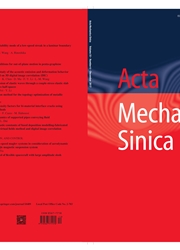

 中文摘要:
中文摘要:
纸在时间领域把一个自我适应的精确算法与无网孔的元素免费 Galerkin 方法(EFGM ) 相结合因为有旋转的解决的粘弹性的问题结盟周期的对称。由在 discretized 时间间隔扩展变量,变量的变化能更精确被描述,并且重复没为非线性的盒子被要求。时空域联合了问题与起始并且边界值能被变换成一系列线性递归的边界值问题,它被一个组理论基于 EFGM 解决。为旋转的全球 EFG 方程的系数矩阵结盟周期的系统,这被证明了只要,是 block-circulant 一种改编对称的引用坐标系统被采用,然后为便于并行处理的一个划分算法经由完全直角的组转变被建议。因此而不是解决原来的系统,仅仅一系列独立小亚问题需要被解决,导致计算便利和更高的计算效率。数字例子被给说明建议算法的完整的优点。
 英文摘要:
英文摘要:
The paper combines a self-adaptive precise algorithm in the time domain with Meshless Element Free Galerkin Method (EFGM) for solving viscoelastic problems with rotationally periodic symmetry. By expanding variables at a discretized time interval, the variations of variables can be described more precisely, and iteration is not required for non-linear cases. A space-time domain coupled problem with initial and boundary values can be converted into a series of linear recursive boundary value problems, which are solved by a group theory based on EFGM. It has been proved that the coefficient matrix of the global EFG equation for a rotationally periodic system is block-circulant so long as a kind of symmetry-adapted reference coordinate system is adopted, and then a partitioning algorithm for facilitating parallel processing was proposed via a completely orthogonal group transformation. Therefore instead of solving the original system, only a series of independent small sub-problems need to be solved, leading to computational convenience and a higher computing efficiency. Numerical examples are given to illustrate the full advantages of the proposed algorithm.
 同期刊论文项目
同期刊论文项目
 同项目期刊论文
同项目期刊论文
 期刊信息
期刊信息
